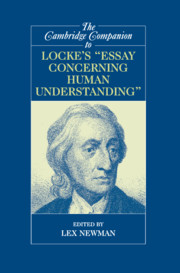Book contents
- Frontmatter
- Introduction
- 1 The Intellectual Setting and Aims of the Essay
- 2 Locke’s Polemic against Nativism
- 3 The Taxonomy of Ideas in Locke’s Essay
- 4 Locke’s Distinctions between Primary and Secondary Qualities
- 5 Power in Locke’s Essay
- 6 Locke on Substance
- 7 Locke on Ideas of Identity and Diversity
- 8 Locke on Ideas and Representation
- 9 Locke on Essences and Classification
- 10 Language, Meaning, and Mind in Locke’s Essay
- 11 Locke on Knowledge
- 12 Locke’s Ontology
- 13 The Moral Epistemology of Locke’s Essay
- 14 Locke on Judgment
- 15 Locke on Faith and Reason
- Bibliography
- Index of Names and Subjects
- Index of Passages Cited
12 - Locke’s Ontology
Published online by Cambridge University Press: 28 July 2007
- Frontmatter
- Introduction
- 1 The Intellectual Setting and Aims of the Essay
- 2 Locke’s Polemic against Nativism
- 3 The Taxonomy of Ideas in Locke’s Essay
- 4 Locke’s Distinctions between Primary and Secondary Qualities
- 5 Power in Locke’s Essay
- 6 Locke on Substance
- 7 Locke on Ideas of Identity and Diversity
- 8 Locke on Ideas and Representation
- 9 Locke on Essences and Classification
- 10 Language, Meaning, and Mind in Locke’s Essay
- 11 Locke on Knowledge
- 12 Locke’s Ontology
- 13 The Moral Epistemology of Locke’s Essay
- 14 Locke on Judgment
- 15 Locke on Faith and Reason
- Bibliography
- Index of Names and Subjects
- Index of Passages Cited
Summary
One of the deepest tensions in Locke's Essay, a work full of profound and productive conflicts, is one between Locke's metaphysical tendencies - his inclination to presuppose or even to argue for substantive metaphysical positions - and his devout epistemic modesty, which seems to urge agnosticism about major metaphysical issues. Both tendencies are deeply rooted in the Essay. Locke is a theorist of substance, essence, and quality. Yet his favorite conclusions are epistemically pessimistic, even skeptical; when it comes to questions about how the world is constituted, our understandings cannot penetrate very far. Locke seems torn between metaphysics and modesty, between dogmatism and skepticism. This chapter will consider two specific examples of this sort of tension. The first involves the ontology of body, and the second the ontology of mind.
The conflict concerning bodily natures looks like this: As is well known, Locke typically describes bodies in the terms of the corpuscularian science of his day, as exemplified especially by the natural philosopher Robert Boyle. Locke's characterizations of the real essences of bodies are mechanist. He envisions them as corpuscularian textures - spatial arrangements of particles possessing size, shape, solidity, and motion. Thus, Locke seems inclined to presuppose a corpuscularian account of the nature of bodies.
- Type
- Chapter
- Information
- Publisher: Cambridge University PressPrint publication year: 2007
- 16
- Cited by



